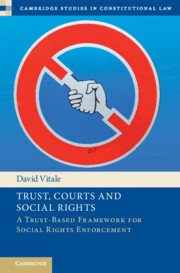Book contents
- Trust, Courts and Social Rights
- Cambridge Studies in Constitutional Law
- Trust, Courts and Social Rights
- Copyright page
- Contents
- Acknowledgements
- Table of Cases
- 1 Introduction
- 2 Conceptualising Trust in the Social Rights Context
- 3 The Citizen–Government Relationship in a Network of Trust Relationships
- 4 A Trust-Based Framework for Enforcing Social Rights?
- 5 The Expectation of Goodwill
- 6 The Expectation of Competence
- 7 The Expectation of Fiduciary Responsibility
- 8 Conclusion
- Bibliography
- Index
- Cambridge Studies in Constitutional Law
6 - The Expectation of Competence
Published online by Cambridge University Press: 08 February 2024
- Trust, Courts and Social Rights
- Cambridge Studies in Constitutional Law
- Trust, Courts and Social Rights
- Copyright page
- Contents
- Acknowledgements
- Table of Cases
- 1 Introduction
- 2 Conceptualising Trust in the Social Rights Context
- 3 The Citizen–Government Relationship in a Network of Trust Relationships
- 4 A Trust-Based Framework for Enforcing Social Rights?
- 5 The Expectation of Goodwill
- 6 The Expectation of Competence
- 7 The Expectation of Fiduciary Responsibility
- 8 Conclusion
- Bibliography
- Index
- Cambridge Studies in Constitutional Law
Summary
This chapter addresses, as a second component of the proposed framework, the second constituent expectation of trust in the citizen-government relationship: competence. It defines the expectation as an expectation of evidence-based policy-making (EBPM) from the elected branches in their exercise of control over social goods and services. Drawing on scholarship on EBPM, it argues that EBPM consists of three forms of knowledge: knowledge from scientific research, ‘political knowledge’ and ‘practical implementation knowledge’. The chapter also details how the courts can enforce the expectation. It explains that for this component, the courts incorporate EBPM into social rights enforcement. More specifically, the courts require the elected branches to provide evidence demonstrating that their decision-making vis-a-vis social goods and services is evidence based. The chapter offers illustrations from various jurisdictions, including Germany, South Africa, the UK and Latvia.
- Type
- Chapter
- Information
- Trust, Courts and Social RightsA Trust-Based Framework for Social Rights Enforcement, pp. 167 - 194Publisher: Cambridge University PressPrint publication year: 2024

